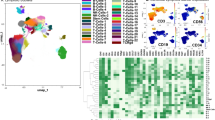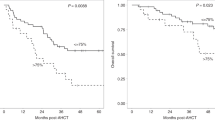Abstract
To understand the prognostic value of lymphocyte recovery after autologous peripheral blood stem cell transplantation (APBSCT), we performed a retrospective study of 59 newly diagnosed multiple myeloma (MM) patients who underwent frontline APBSCT. Conditioning regimens were melphalan 100 mg/m2 for 2 days. Following APBSCT, all patients showed complete or partial response. Median follow-up time was 29.57 months and median recovery of absolute lymphocyte count (ALC) ⩾1000/mm3 was 23 days. Univariate analysis revealed that significant predictors of overall survival (OS) included bone marrow (BM) plasma cells ⩽40% at diagnosis (P=0.0243) and recovery of ALC ⩾1000/mm3 by day +23 (P=0.0156). Positive predictors for progression-free survival (PFS) were BM plasma cells ⩽40% at diagnosis (P=0.0134) and recovery of ALC ⩾1000/mm3 by day +23 (P=0.0243). Absolute neutrophil count ⩾1000/mm3 on day +12 was marginally significant for OS and PFS (P=0.0821 and P=0.1153, respectively). Multivariate analysis showed that ALC ⩾1000/mm3 on day +23 independently predicted OS (P=0.031) and prolonged PFS (P=0.011), and that serum β2-microglobulin was marginally significant for prolonged OS (P=0.066). In conclusion, ALC recovery was an independent predictor of both OS and PFS in MM.
This is a preview of subscription content, access via your institution
Access options
Subscribe to this journal
Receive 12 print issues and online access
$259.00 per year
only $21.58 per issue
Buy this article
- Purchase on Springer Link
- Instant access to full article PDF
Prices may be subject to local taxes which are calculated during checkout


Similar content being viewed by others
References
Crawley C, Lalancette M, Szydlo R, Gilleece M, Peggs K, Mackinnon S et al. Outcomes for reduced-intensity allogeneic transplantation for multiple myeloma: an analysis of prognostic factors from the Chronic Leukaemia Working Party of the EBMT. Blood 2005; 105: 4532–4539.
Vesole DH . Transplantation for multiple myeloma: who, when, how often? Patient selection and goals. Blood 2003; 102: 3471–3472.
Kumar A, Loughran T, Alsina M, Durie BG, Djulbegovic B . Management of multiple myeloma: a systematic review and critical appraisal of published studies. Lancet Oncol 2003; 4: 293–304.
Porrata LF, Litzow MR, Markovic SN . Immune reconstitution after autologous hematopoietic stem cell transplantation. Mayo Clin Proc 2001; 76: 407–412.
Steingrimsdottir H, Gruber A, Bjorkholm M, Svensson A, Hansson M . Immune reconstitution after autologous hematopoietic stem cell transplantation in relation to underlying disease, type of high-dose therapy and infectious complications. Haematologica 2000; 85: 832–838.
Hernandez MD, del Canizo MC, Gonzalez M, Caballero MD, Lopez-Berges MC, Vazquez L et al. Immune reconstitution after autologous progenitor hemopoietic cell transplantation. A study comparing autologous bone marrow and autologous peripheral blood transplantation. Med Clin (Barc) 1998; 110: 768–773.
Roberts MM, To LB, Gillis D, Mundy J, Rawling C, Ng K et al. Immune reconstitution following peripheral blood stem cell transplantation, autologous bone marrow transplantation and allogeneic bone marrow transplantation. Bone Marrow Transplant 1993; 12: 469–475.
Rosillo MC, Ortuno F, Moraleda JM, Lozano ML, Heras I, De Arriba F et al. Immune recovery after autologous or rhG-CSF primed PBSC transplantation. Eur J Haematol 1996; 56: 301–307.
Marin GH, Mendez MC, Menna ME, Malacalza J, Bergna MI, Klein G et al. Immune recovery after bone marrow and peripheral blood stem cells transplantation. Transplant Proc 1999; 31: 2582–2584.
Kim H, Sohn HJ, Kim SE, Kang HJ, Park S, Kim S et al. Lymphocyte recovery as a positive predictor of prolonged survival after autologous peripheral blood stem cell transplantation in T-cell non-Hodgkin's lymphoma. Bone Marrow Transplant 2004; 34: 43–49.
Porrata LF, Gertz MA, Inwards DJ, Litzow MR, Lacy MQ, Tefferi A et al. Early lymphocyte recovery predicts superior survival after autologous hematopoietic stem cell transplantation in multiple myeloma or non-Hodgkin lymphoma. Blood 2001; 98: 579–585.
Porrata LF, Gertz MA, Litzow MR, Lacy MQ, Dispenzieri A, Inwards DJ et al. Early lymphocyte recovery predicts superior survival after autologous hematopoietic stem cell transplantation for patients with primary systemic amyloidosis. Clin Cancer Res 2005; 11: 1210–1218.
Porrata LF, Ingle JN, Litzow MR, Geyer S, Markovic SN . Prolonged survival associated with early lymphocyte recovery after autologous hematopoietic stem cell transplantation for patients with metastatic breast cancer. Bone Marrow Transplant 2001; 28: 865–871.
Porrata LF, Inwards DJ, Micallef IN, Ansell SM, Geyer SM, Markovic SN . Early lymphocyte recovery post-autologous haematopoietic stem cell transplantation is associated with better survival in Hodgkin's disease. Br J Haematol 2002; 117: 629–633.
Porrata LF, Litzow MR, Inwards DJ, Gastineau DA, Moore SB, Pineda AA et al. Infused peripheral blood autograft absolute lymphocyte count correlates with day 15 absolute lymphocyte count and clinical outcome after autologous peripheral hematopoietic stem cell transplantation in non-Hodgkin's lymphoma. Bone Marrow Transplant 2004; 33: 291–298.
Porrata LF, Litzow MR, Tefferi A, Letendre L, Kumar S, Geyer SM et al. Early lymphocyte recovery is a predictive factor for prolonged survival after autologous hematopoietic stem cell transplantation for acute myelogenous leukemia. Leukemia 2002; 16: 1311–1318.
Schrama JG, Rodenhuis S, De Gast GC . Prolonged survival associated with early lymphocyte recovery after autologous hematopoietic stem cell transplantation for patients with metastatic breast cancer. Bone Marrow Transplant 2003; 31: 141–142.
Jacobson JL, Hussein MA, Barlogie B, Durie BG, Crowley JJ . A new staging system for multiple myeloma patients based on the Southwest Oncology Group (SWOG) experience. Br J Haematol 2003; 122: 441–450.
Attal M, Harousseau JL, Stoppa AM, Sotto JJ, Fuzibet JG, Rossi JF et al. A prospective, randomized trial of autologous bone marrow transplantation and chemotherapy in multiple myeloma. Intergroupe Francais du Myelome. N Engl J Med 1996; 335: 91–97.
Palumbo A, Bringhen S, Petrucci MT, Musto P, Rossini F, Nunzi M et al. Intermediate-dose melphalan improves survival of myeloma patients aged 50–70: results of a randomized controlled trial. Blood 2004; 104: 3052–3057.
Child JA, Morgan GJ, Davies FE, Owen RG, Bell SE, Hawkins K et al. High-dose chemotherapy with hematopoietic stem-cell rescue for multiple myeloma. N Engl J Med 2003; 348: 1875–1883.
Barlogie B, Shaughnessy J, Tricot G, Jacobson J, Zangari M, Anaissie E et al. Treatment of multiple myeloma. Blood 2004; 103: 20–32.
Desikan R, Barlogie B, Sawyer J, Ayers D, Tricot G, Badros A et al. Results of high-dose therapy for 1000 patients with multiple myeloma: durable complete remissions and superior survival in the absence of chromosome 13 abnormalities. Blood 2000; 95: 4008–4010.
Fassas AB, Spencer T, Sawyer J, Zangari M, Lee CK, Anaissie E et al. Both hypodiploidy and deletion of chromosome 13 independently confer poor prognosis in multiple myeloma. Br J Haematol 2002; 118: 1041–1047.
Shaughnessy J, Jacobson J, Sawyer J, McCoy J, Fassas A, Zhan F et al. Continuous absence of metaphase-defined cytogenetic abnormalities, especially of chromosome 13 and hypodiploidy, ensures long-term survival in multiple myeloma treated with Total Therapy I: interpretation in the context of global gene expression. Blood 2003; 101: 3849–3856.
Moreau P, Facon T, Leleu X, Morineau N, Huyghe P, Harousseau JL et al. Recurrent 14q32 translocations determine the prognosis of multiple myeloma, especially in patients receiving intensive chemotherapy. Blood 2002; 100: 1579–1583.
Calasanz MJ, Cigudosa JC, Odero MD, Garcia-Foncillas J, Marin J, Ardanaz MT et al. Hypodiploidy and 22q11 rearrangements at diagnosis are associated with poor prognosis in patients with multiple myeloma. Br J Haematol 1997; 98: 418–425.
Chang H, Sloan S, Li D, Zhuang L, Yi QL, Chen CI et al. The t(4;14) is associated with poor prognosis in myeloma patients undergoing autologous stem cell transplant. Br J Haematol 2004; 125: 64–68.
Lee KH, Choi SJ, Lee JH, Lee JS, Kim WK, Lee KB et al. Prognostic factors identifiable at the time of onset of acute graft-versus-host disease after allogeneic hematopoietic cell transplantation. Haematologica 2005; 90: 939–948.
Kim DH, Kim JG, Sohn SK, Sung WJ, Suh JS, Lee KS et al. Clinical impact of early absolute lymphocyte count after allogeneic stem cell transplantation. Br J Haematol 2004; 125: 217–224.
Horowitz MM, Gale RP, Sondel PM, Goldman JM, Kersey J, Kolb HJ et al. Graft-versus-leukemia reactions after bone marrow transplantation. Blood 1990; 75: 555–562.
Mohty M, Boiron JM, Damaj G, Michallet AS, Bay JO, Faucher C et al. Graft-versus-myeloma effect following antithymocyte globulin-based reduced intensity conditioning allogeneic stem cell transplantation. Bone Marrow Transplant 2004; 34: 77–84.
Damiani D, Stocchi R, Masolini P, Michelutti A, Sperotto A, Geromin A et al. Dendritic cell recovery after autologous stem cell transplantation. Bone Marrow Transplant 2002; 30: 261–266.
Author information
Authors and Affiliations
Corresponding author
Rights and permissions
About this article
Cite this article
Kim, H., Sohn, HJ., Kim, S. et al. Early lymphocyte recovery predicts longer survival after autologous peripheral blood stem cell transplantation in multiple myeloma. Bone Marrow Transplant 37, 1037–1042 (2006). https://doi.org/10.1038/sj.bmt.1705373
Received:
Revised:
Accepted:
Published:
Issue Date:
DOI: https://doi.org/10.1038/sj.bmt.1705373
Keywords
This article is cited by
-
The association of mobilising regimen on immune reconstitution and survival in myeloma patients treated with bortezomib, cyclophosphamide and dexamethasone induction followed by a melphalan autograft
Bone Marrow Transplantation (2021)
-
Combined immune score of lymphocyte to monocyte ratio and immunoglobulin levels predicts treatment-free survival of multiple myeloma patients after autologous stem cell transplant
Bone Marrow Transplantation (2020)
-
Oral calcitriol in hematopoietic recovery and survival after autologous stem cell transplantation: a randomized clinical trial
DARU Journal of Pharmaceutical Sciences (2019)
-
Infusion of autograft natural killer cell/CD14+HLA-DRDIM cell ratio predicts survival in lymphoma post autologous stem cell transplantation
Bone Marrow Transplantation (2018)
-
Cellular immunotherapy for plasma cell myeloma
Bone Marrow Transplantation (2013)



